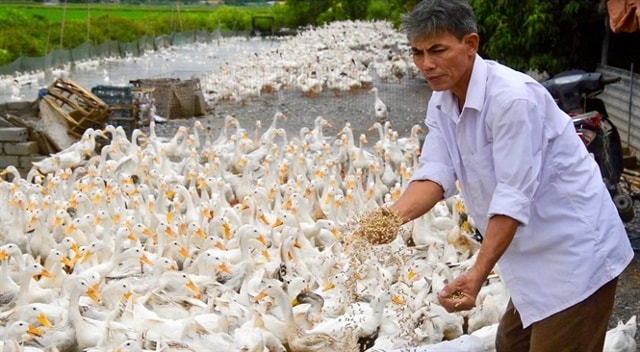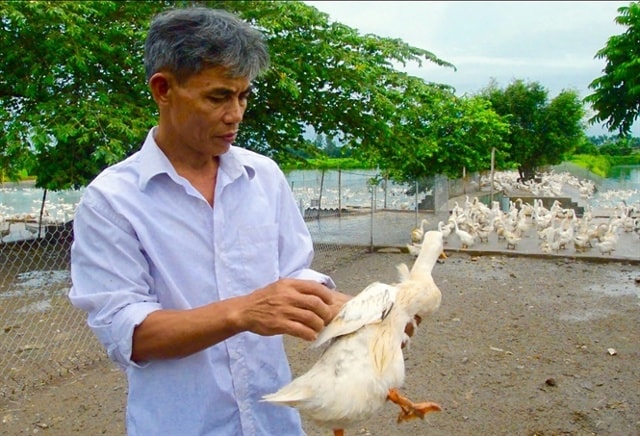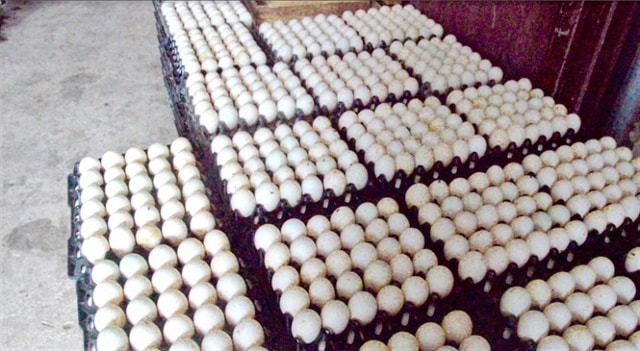The Duck Lord picks up a sack of money every day.
In the Chiem Khe region during the rotten season, if he did not stick with ducks, he would not know what else to do. And then, one day, a flock of more than 50,000 waterfowl honored him as the “king of ducks in the North”.
3 times "knocked down" by duck
Mr. Duong Trung Hau in village 9, Nhat Tuu commune, Kim Bang district, Ha Nam admitted that he understood the duck’s temperament better than his wife’s. His fate was pushed down to the bottom of the mud by this “quacking duck”. But in the end, his courage and “reckless blood” helped him “shake off the mud and stand up to shine”.
Since the 90s of the last century, his name has been quite famous in the cross-country egg trading community. At that time, the North was not self-sufficient in egg supply. He traveled all over the Central and Southern regions to find sources of goods to distribute. As a result, he had business partners everywhere.
 |
| Mr. Hau with his flock of ducks. Photo: Internet |
In 2000, this old farmer “sponsored” more than 100 households raising ducks in the area and 28 incubators with a total capacity of 25,000 balut eggs/day. The first bird flu epidemic in Vietnam lasted for 3 months, raging in 2003, egg prices plummeted, only 200 - 300 VND/egg (a loss of 1,200 VND/egg compared to production cost).
He and his wife went around the village selling off their eggs, but no one bought them. The trays of eggs were stacked high. The eggs could not be kept for long, and they broke and rotted all over the house. After that incident, his “boss” of egg production was weakened, each owner owed hundreds of millions of dong, and Mr. Hau alone lost nearly half a billion dong.
At first, he planned to sell eggs in a literary way, making little money. But then, the blood of a “duck herder since childhood” rose again. He continued to use the remaining capital to provide feed and breeds for farmers, and to import incubators for home use.
After two years of recovery, another disaster struck. Avian influenza broke out again in 2005. Egg exchanges between provinces were not allowed, and authorities closely monitored the situation. From the first floor to the second floor of Mr. Hau's house, eggs were stacked up like mountains, and many were not sold, so they had to be dumped, causing a loss of 800 million VND.
In 2007, there was another storm in the price of bran. The price was 163,000 VND/bag, then it increased to 312,000 VND, the bran price list changed 24 times from July to December due to the economic crisis. Egg prices competed with bran prices like turtles racing rabbits, resulting in heavy losses. But "because I am an enthusiastic person, I tried to recover at all costs," said Mr. Hau.
Pick up... a sack of money every day
 |
| a |
In 2012, Nhat Tuu commune consolidated land and exchanged plots. Mr. Hau rented 24 acres of low-lying rice fields from the people of hamlet 9 for a period of 50 years and changed the purpose of use. In this land of rotten rice fields, where one rice crop a year is considered lucky, people have witnessed a strange change.
The more than 1km long internal road was paved and widened by nearly 3m to allow trucks to roll; dozens of electric poles were erected to lead power from the residential area to the farm. It is impossible to count how many cubic meters of soil were scooped up to form ponds. It is impossible to count how many bricks, stones, and cement were poured down to make the long rows of houses like trains rise up.
The first year, he raised only 5,000 super tall ducks and made a big profit. With a ready market, the career of old farmer Duong Trung Hau was like a rocket on the launch pad.
He said: “The super tall duck breed originating from Zhejiang province - China, which I self-bred and hatched, has an egg-laying rate of up to 83%. On average, I collect 40,000 eggs per day. In the North, I am the person who raises the most laying ducks.”
Although he raises ducks at a fairly high density (3 ducks/m2), his farm has not had any disease outbreaks over the past 5 years because they have been fully vaccinated. To collect all the duck eggs on the farm and transfer them to the warehouse, he hires about 15 regular workers. Because of his brand, "Mr. Hau's duck eggs" are sought after by traders everywhere, and are sold out as soon as they are produced.
From above, Mr. Hau’s giant flock of ducks formed a white carpet. Seeing their owner coming to visit, they quacked, stretched their wings to express their joy, and then waddled closer. The “father” of 50,000 children said: “Nearly 10 billion VND has been poured into this low-lying land to make it what it is today. If anything goes wrong, I probably won’t be able to survive. But first, let’s be happy, because every morning when I wake up, I see rows of duck eggs covering the coop, selling for a fortune.”
"I swear to always clean eggs"
 |
| Internet photo |
After many years of working in the poultry egg industry, “king of laying ducks” Duong Trung Hau understands better than anyone: Reputation can sustain a business in the most difficult situations. But if you lose it, you can be taken down even when you are proudly at the peak of fame. Therefore, before being released to the market, each duck egg is carefully inspected and “examined”, especially, it must be… “fresh”. That is, as soon as it is produced, it is sold out, rather than being thrown away, it is absolutely not possible to sell “expired” eggs to consumers.
Mr. Hau estimates that the cost of producing an egg is about 1,500 VND, the average selling price of eggs is about 1,700 VND/egg (profit of 200 VND/egg). Each year, his duck flock lays nearly 15 million eggs (equivalent to a profit of about 3 billion VND). In addition, he also earns hundreds of millions of VND from other investments at the farm such as raising fish, planting fruit trees around (creating space for ducks to bathe, as well as providing shade and landscaping).
This man is planning to build a facility to process and preserve eggs, and develop a brand so that more people will know about it. Hopefully, his eggs will be sold on the shelves of supermarket chains in Hanoi and other big cities.
“I am lucky to have closed the production and consumption chain of duck eggs according to the “reverse process”. That means setting up a distribution system first, then investing in farm-scale breeding. Thanks to that, I can regulate production activities to suit the market rules, minimizing the risk of “good harvest, low price”, said Mr. Duong Trung Hau.
According to Vietnamnet
| RELATED NEWS |
|---|

